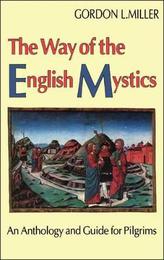
|
Way of The English Mystics
Paperback / softback
Main Details
| Title |
Way of The English Mystics
|
| Authors and Contributors |
By (author) Gordon C. Miller
|
| Physical Properties |
| Format:Paperback / softback | | Pages:192 | | Dimensions(mm): Height 216,Width 138 |
|
| Category/Genre | Anthologies
Christian worship, rites and ceremonies |
|---|
| ISBN/Barcode |
9780860122098
|
| Classifications | Dewey:248.220922 |
|---|
| Audience | | Professional & Vocational | | General | |
|---|
|
Publishing Details |
| Publisher |
Bloomsbury Publishing PLC
|
| Imprint |
Burns & Oates Ltd
|
| Publication Date |
1 July 1996 |
| Publication Country |
United Kingdom
|
Description
A distinctive feature of Western religious life in recent years has been the rediscovery of the contemplative tradition in Christianity. One of the beneficial effects of the importation of Eastern forms of spirituality has been to send people back to the rich tradition of mysticism within Christianity. Within the Western mystical tradition, England holds a unique place, with a number of major figures from the Middle Ages, and later whose writings have interested generations of readers. This book presents seven of them, five from the Medieval period: Richard Rolle, the author of "The Cloud of Unknowing"; Julian of Norwich and Margery Kempe; and two from later centuries, William Law and George Herbert. Each chapter consists of an introductory essay on the life and writings of each, followed by carefully chosen extracts from their writings. Throughout the ages, however, spiritual pilgrims have undertaken physical pilgrimages as well, all seeking in various ways to participate in something larger than themselves, a common spirit, a universal Spirit. One aim of this book is to encourage its readers to share in this spirit by visiting the sites from which the writings arose. Each chapter is provided with a map of the area of immediate interest and a drawing of the place most associated with each figure, and the introductory essays contain practical infromation about how to get there. The extracts from the mystics' writings are designed to further the same feeling of immediacy. Those from the Medieval period are in new translations, some made specially for this book, some adapted from recent versions, Margery Kempe, for example. William Law and George Herbert, writing the elegant, comprehensible English of the 17th and 18th centuries respectively, have been left in their original form, with only the spelling updated.
|